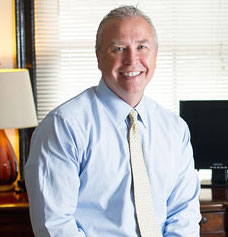
Cramer & Anderson Divorce & Family Law Partner Ken Taylor
Cramer & Anderson Divorce & Family Law Partner Ken Taylor recently completed a 40-hour training course through the Connecticut Council for Non-Adversarial Divorce to become certified in divorce mediation.
“We had experts in mediation, experts in social work, and experts in psychology make presentations,” Attorney Taylor explained. “We explored the different models of mediation, and how to work with people that come from different cultural, educational, and emotional backgrounds, and we conducted approximately 10 role playing exercises.”
The majority of the 20 participants were attorneys, but the group also included financial planners, mental health professionals, and a life coach.
Divorce in Connecticut is handled in one of three ways: the traditional method is typically adversarial, while the other methods involve mediation and collaborative divorce.
In traditional divorce, both sides hire attorneys and engage in an often contentious court process.
In mediation, a neutral mediator shepherds the parties toward a mutually acceptable outcome without formally representing either side.
Collaborative divorce is a hybrid method in which each spouse is represented by an attorney and both agree to collaborate on achieving an equitable resolution based on mutual goals set at the beginning of the process.
Attorney Taylor has been offering the collaborative model of divorce for several years as a way of removing the adversarial nature of dealing with such charged issues as assets, finances, and issues of custody. He is a member of the Collaborative Divorce Group of Western Connecticut and The Litchfield County Collaborative Divorce Group.
“Mediation is a good fit with my collaborative practice,” Attorney Taylor said. “Like collaborative divorce, it can generally be a less expensive alternative and provides divorcing couples with much more control over the outcome of the divorce, which hopefully leads to a better life post-divorce for both parties.”
Both mediation and collaborative divorce tend to avoid the long-term scars that result from traditional divorce, which is an important consideration for spouses with children and extended families.
In the mediation certification training, Attorney Taylor studied the evaluative, facilitative, and transformative styles of mediation, while assembling a “toolbox” of resources that includes determining clients’ suitability for mediation, narrowing the issues to be resolved, developing and testing options and proposals, and efficiently and effectively reaching an agreement.

Partner Chris Sochacki
Cramer & Anderson Partner Christopher Sochacki also recently completed a 40-hour general mediation certificate training program via the Quinnipiac University School of Law Center on Dispute Resolution.
Attorney Sochacki’s Civil Litigation practice focuses on helping people who have been wronged or injured, including Injury and Workers’ Compensation cases, but his recent training in mediation and conflict management applies to all types of legal issues and litigation, including pre-litigation.
The goal of mediation for any legal issue is to find “common ground” that allows all parties to reach an agreement that works for all involved, which litigation does not accomplish.
Partner Barry S. Moller, whose practice focuses primarily on Workers’ Compensation and Personal Injury, participated in a unique mediation course in 2019 at the peace and reconciliation organization Corrymeela in Northern Ireland.

Partner Randy DiBella
Partner Randy DiBella also has alternative dispute resolution (ADR) experience, and works collaboratively within the firm’s team approach to extend the benefits of mediation to the issues clients seek to resolve in an optimal and cost-effective way.
Working With Cramer & Anderson
Our attorneys and staff are working in our offices, where proper sanitation and social distancing measures remain strictly observed amid the COVID-19 coronavirus, as well as remotely.
Attorneys are available as usual by phone or email, and are also connecting with clients using technology such as Zoom. For more information, see the firm’s website or call the flagship office in New Milford at (860) 355-2631. Other regional offices are located in Danbury, Ridgefield, Kent, Washington Depot, and Litchfield.


